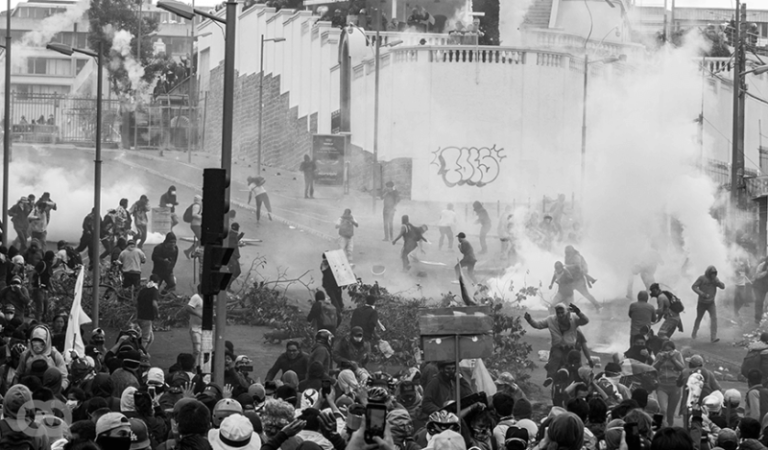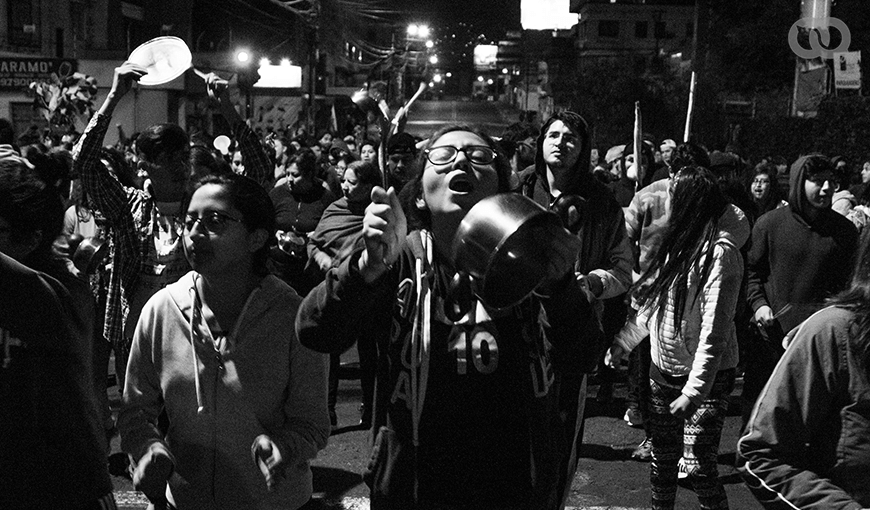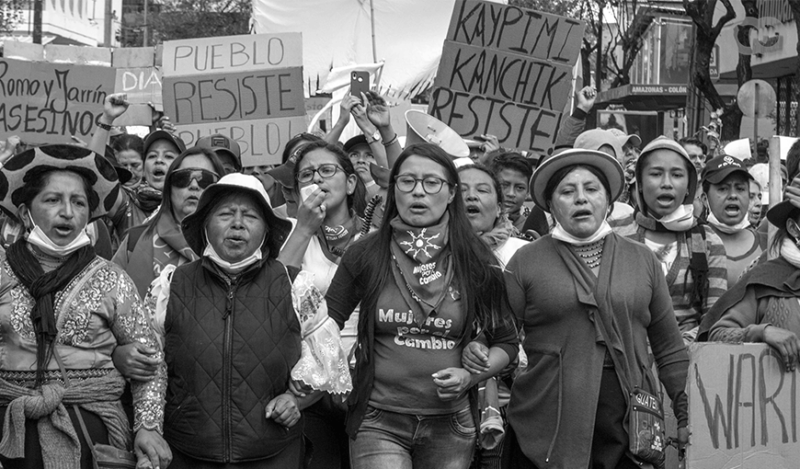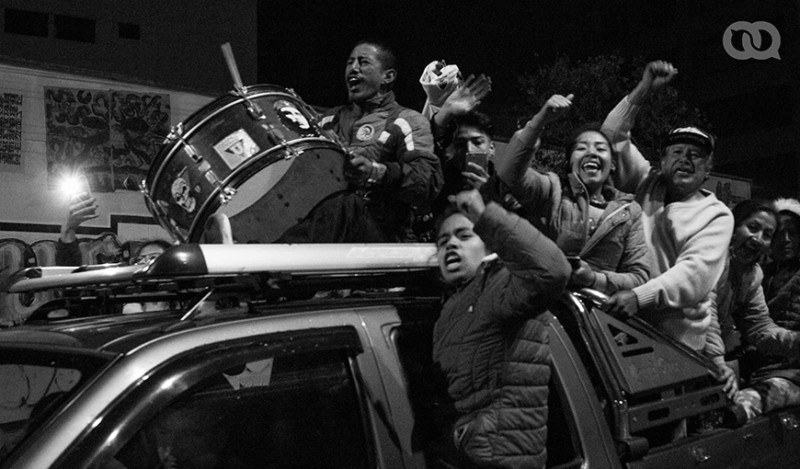
Children of Exile: The Births “Sowing Hope” in the Camp of Nicaraguan Farmers

PUBLICIDAD 1M
PUBLICIDAD 4D
PUBLICIDAD 5D
In Ecuador, people protest because the fuel subsidy was cut and in Cuba, people pretend "normality" without regular transport services.

“Everything is new. Every sound, every small dose of tear gas that managed to get into the house without any warning. My eyes and throat burned and a Venezuelan friend (an expert in the matter) said: ‘that’s tear gas, close the window.’ And the first thing that came to my mind was: if it’s this bad for me in the safety of my own home, what’s it like for those who have been in the streets all day.”
According to Alexis Pire, a Cuban journalist living in Ecuador, “every detail about this civil conflict” was new to him. “From police ‘dressed up’ as robots, the armored cars and riot brigades, to burnt tires on every street corner.”
Starting October 3rd, indigenous groups, as well as transport drivers and students, led protests against a package of measures announced by president Lenin Moreno’s government, in the Andean country. The “paquetazo” (severe austerity measures), as it became known, included cuts in public sector pay and holidays and, more importantly, the elimination of fuel subsidies, which has been in effect for 40 years in this country.
Protests against new fuel prices (up to 123%) led to clashes between civilians and police forces, over 12 days.
On October 13th, the government revoked Decree-Law 889, which stipulated these economic adjustments. According to a report by Ecuador’s Public Defender’s Office, seven persons died in the clashes and another 1,152 were arrested during the national strike and State of Emergency.
At the height of the protests, a large citizen participation included the “cacerolazo” (banging pots and pans), when Quito residents took the streets and challenged the curfew, banging their pots and pans to demand alternatives to the government’s austerity measures.
“These things don’t happen in my country (Cuba),” Pire said, even a State of Emergency isn’t normal for a Cuban living in Ecuador. “There is no clear definition of what the curfew is. Night fills with a loud and overwhelming sound, “experts” immediately call or message you: “Can you hear the cacerolazo?”. And because you don’t want to come across stupid, you immediately look it up on Google. Ah, yes. Cacerolazo: the sound citizens make with their pots and pans in response to a curfew. I don’t know whether any other Cuban has seen this is in the movies, because I had no reference whatsoever for that imposing moment.”

Photo: Alejandro Ramirez Anderson (elToque)
When he thinks about the state of things in Cuba and compares it with what he’s experiencing in Ecuador, Pires’ thoughts sway between “it’s great I haven’t seen such degrading conflicts” and “how cowardly we are, to bear it in silence and ideological manipulation and not allowing Cuban citizens to stop and say: ‘here I am’.”
As a professional journalist, something in particular caught his eye: the availability of information. “You choose who you want to believe, you can identify who is manipulating, speculating or omitting information. Ecuadorean press, mainly daily newspapers, have sidestepped many of the real scenes (on the street, the violent and bloody clashes), but you can follow them live on RT, CNN or TeleSUR. You’re not left in the dark.”
He says that among all the photos that go around social media every day about the protests, he found one particularly interesting that showed a sign on the wall: The people rule. “I’ve heard this phrase and others like it declared (in Cuba) as a slogan over and over again, but I understood the true meaning of this nominal phrase now, under these circumstances.
Ecuadoreans talk about overthrowing presidents, three have already gone (Abdala Bucaran, 1997; Jamil Mahuad, 2000; Lucio Gutierrez, 2005) and all of these handovers of power sound like a science fiction movie to me.
“In Ecuador, people are protesting because the fuel subsidy was cut and in Cuba, people walk about ‘with a smile on their faces’ with a state of ‘normality’ without regular transport services. What a shame! I receive messages from Cuba: “Keep quiet, don’t publish anything that will lead to problems.” This is the chip we have grown up with, the fear of speaking one’s mind, of protesting, of being heard by the neighbor who is a State Security informant.”
Leandro Alvarez tells us that his house is surrounded by nothing but jungle. He lives in Tena, southeast of Quito. He moved there not long after emigrating to Ecuador back in 2013. That town, which was quite similar to his neighborhood in Las Tunas “but with more commerce and development”, is a lot calmer than the capital or Guayaquil. Or it was at least, until the indigenous protests broke out.
“This is getting really ugly, things are bad,” he wrote on Messenger during the days of protest. “This area is being seriously affected because there are many indigenous people. They don’t want anyone to work, they want everyone out on the street protesting. They ransack any business that opens.”
Leandro owns a barber shop which cost him an arm and a leg to open. His earnings cover the rent and some of his family’s expenses. The 12-day national strike was a disaster for him. He opened up his business in secret, afraid of being sacked, taking great care that another wave of protestors wasn’t on its way, always remembering how his friend was beaten when she went to work.

Photo: Alejandro Ramirez Anderson (elToque)
The city was cut off for several days, food was running out, nobody could enter or leave. Many people took advantage of the unrest to loot and steal. While the situation was dangerous, Leandro never feared for his children and his wife’s safety. There are some 30 Cubans living in Tena.
However, he says that “things got worse” in other cities, they had never seen so much violence before: people with sticks and spears, burning tires in the street, destroying parks and buildings, the police throwing three people off a bridge.
Even though he lives on the coast, and protests were practically zero there, Luis Enrique Perdomo has been keeping up-to-date with the situation in the country he has lived in for years. In his region, classes being suspended was the main thing that happened.
“They blamed Maduro and Correa,” he says. “This is xenophobia that the government itself has encouraged in its media.”
Luis Enrique has been following the case of Yoelvis Araujo Cruz, a Cuban who made a living as an Uber driver in Ecuador.
“This Cuban was among the 19 people arrested near the Mariscal Sucre airport,” he says. “They released 15 without charges, but four of them, including the Cuban, will have a hearing on October 21st. Illicit association, you know how it is: they invent a charge and get you mixed up in it.”
According to an article published by Luis Enrique, “those arrested were accused of tracking the president and vice-president of Ecuador’s movements. It was also said that they were working in intelligence, and that they even attempted to destabilize the government.”
In the Cuban’s case, the district attorney’s office based this on the fact that he had three cellphones in his car.
Meanwhile in Cuba, Giordan Alvarez is calling upon Cuban diplomats in Ecuador to intervene for the Matanzas native, and says that Yoelvis was waiting for a friend who was arriving in Ecuador on a flight from Panama.
Even though the Cuban government hasn’t made an official statement about these charges, the Cuban community in Ecuador and Cuba have expressed their solidarity.
“Until they prove the opposite, Cuban Yoelvis is innocent of the charges he is being accused of and his arrest is arbitrary, just like it is arbitrary to label him a “spy” or “criminal”, Luis Enrique says.
Leandro Alvarez says that on social media, videos circulated saying that it was Cubans and Venezuelans who were attacking and stealing from businesses. “They said that we were being paid off by Correa supporters to stir things up. They want to marginalize us here. We had to sit at home.”
Like Leandro, many Cubans decided to wait these protests out at home and avoid running into any problems. The Association of Cuban residents in Ecuador (ACURE) posted a statement on its Facebook page, in which it made a call to “avoid protests that promote the rejection of our fellow countrymen.” “(…) We respect this noble people and their government. Therefore, we are asking the Government to eliminate any harmful opinion about the Cuban community living in the country, who are also protected by the Ecuadorean Constitution.”

The Ecuadorean people celebrate the repeal of Decree-Law 883. Photo: Alejandro Ramirez Anderson (elToque)
Nearly every Cuban we contacted had decided to wait at home for the unrest to die down and are watching the protests on their balconies, from their windows or the TV, which is something completely new for the majority.
“We have stayed at home, there’s been a curfew from 3 PM onwards. Nearly every Cuban I know here is just taking it easy at home, waiting for the storm to blow over,” Yulianela Rodriguez said as the protests raged. “We are trying to not have an opinion because Ecuadoreans feel like we shouldn’t,” she says.
“Many Cubans want to leave already. On Friday, I caught an Uber and the driver was Cuban, he told me that he was thinking about leaving the country. We want to stay here, said Yulianeli. My husband and I even bought an apartment and starting all over again is hard. I admire the Ecuadorean people for their bravery to take to the streets and protest. We have to have faith that this situation will work out for the best of everyone.”
Other Cubans actively participated in the protests and contributed to mobilization efforts on their social media. We had news of at least two Cubans who were very active in recent days, but they hadn’t replied to our messages asking for their testimonies and experiences. Maybe they took to the street, with other Cubans and Ecuadoreans, to rebuild the city.
Originally posted in Havana Times.
Archivado como:
PUBLICIDAD 3M
PUBLICIDAD 3D